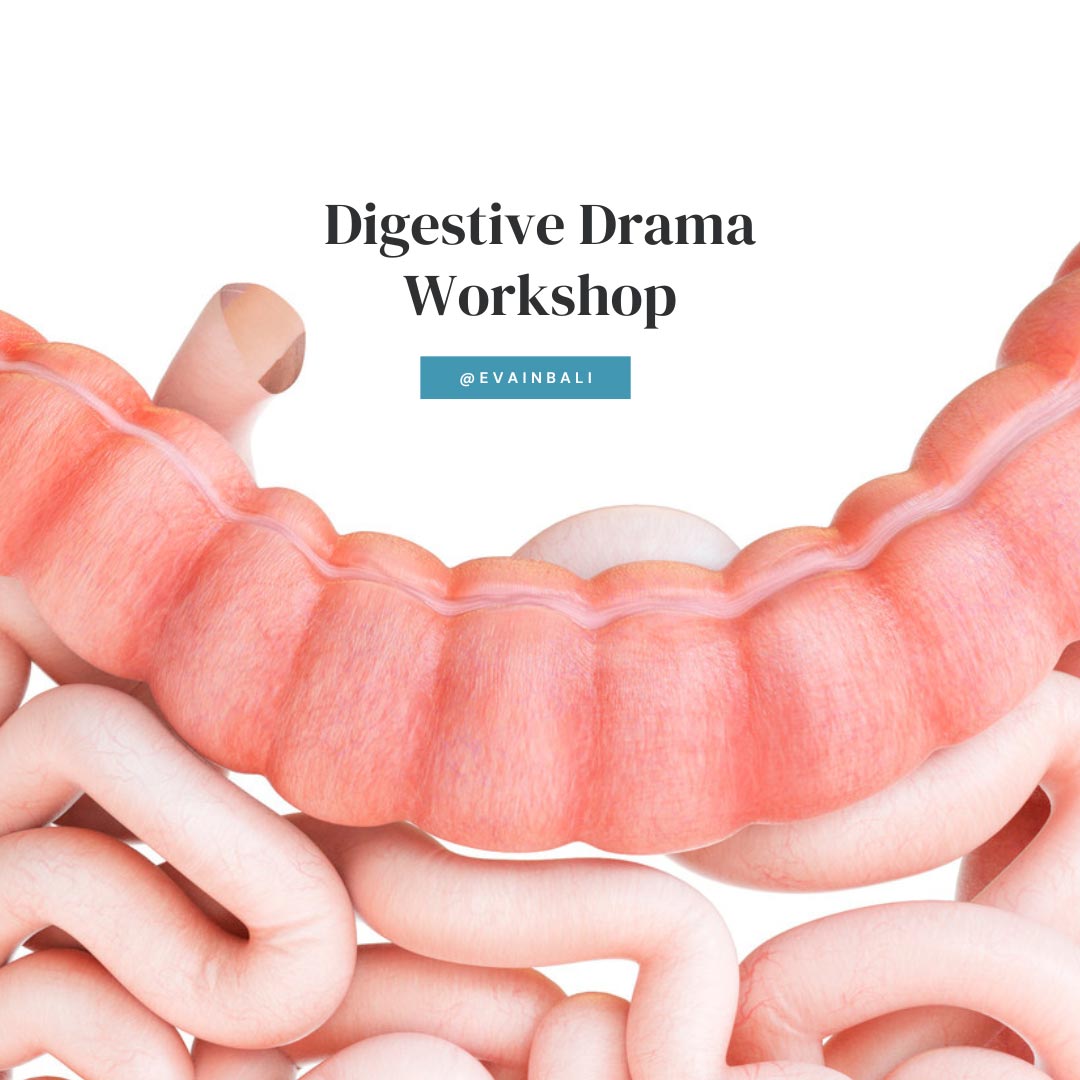Digestive Drama Workshop
Digestive Drama Workshop

What the Gut?
A massive portion of our immunity is found in our gut, and 95% of our serotonin, the happy hormone is produced right there. Hence, there consists a direct gut brain axis of bidirectional communication between the central and the enteric nervous system, linking emotional and cognitive centres of the brain with our intestinal functions. We often use our “gut feeling” to make difficult decisions, and when we are nervous of a big event we have “butterflies” in our stomachs.
Poor gut health can lead to:
- Bloating, no energy, exhaustion after eating, cravings,
- Having ups and downs, fatigue, brain fog, cramps and weight fluctuation
It’s a familiar fact:
Humans have more bacterial cells—a lot more—than human cells. Bacteria live on the skin, in the nose and ears, and, most of all, in the gut. Your gut houses 500 species of bacteria. Too many negatives like parasites, yeast, sugar feeding bacteria or not enough good ones can spell serious trouble for your health.There are simple steps to start reducing inflammation and heal the gut, improve skin, and to feel better:
- Remove the bad bugs and food allergens.
- Repair the gut lining.
- Replace needed enzymes, fibre and prebiotic.
- Reinoculate your gut with good bacteria (probiotics)
Signs of an unhealthy Gut
Many facets of modern life such as high stress levels, too little sleep, eating processed and high-sugar foods, and taking antibiotics can all damage our gut microbiome. This in turn may affect other aspects of our health, such as the brain, heart, immune system, skin, weight, hormone levels, ability to absorb nutrients, and even the development of cancer. There are a number of ways an unhealthy gut might manifest itself. Here are the most common signs:
Digestive drama
Stomach disturbances like gas, bloating, constipation, diarrhea, and heartburn can all be signs of an unhealthy gut. A balanced gut will have less difficulty processing food and eliminating waste.
A high-sugar diet
A diet high in processed foods and added sugars can decrease the amount of good bacteria in your gut. This imbalance can cause increased sugar cravings, which can damage your gut still further. High amounts of refined sugars, particularly high-fructose corn syrup, have been linked to increased inflammation in the body.
Unintentional weight changes
Gaining or losing weight without making changes to your diet or exercise habits may be a sign of an unhealthy gut. An imbalanced gut can impair your body’s ability to absorb nutrients, regulate blood sugar, and store fat. Weight loss may be caused by small intestinal bacterial overgrowth (SIBO), while weight gain may be caused by insulin resistance or the urge to overeat due to decreased nutrient absorption.
Sleep disturbances or constant fatigue
An unhealthy gut may contribute to sleep disturbances such as insomnia or poor sleep, and therefore lead to chronic fatigue. The majority of the body’s serotonin, a hormone that affects mood and sleep, is produced in the gut. So gut damage can impair your ability to sleep well.
Skin irritation
Skin conditions like eczema may be related to a damaged gut. Inflammation in the gut caused by a poor diet or food allergies may cause increased “leaking” of certain proteins out into the body, which can in turn irritate the skin and cause conditions such as eczema.
Recommendations for a healthy Gut
Lower your stress levels
Chronic high levels of stress are hard on your whole body, including your gut. Some ways to lower stress may include meditation, walking, getting a massage, spending time with friends or family, diffusing essential oils, decreasing caffeine intake, laughing, yoga, or having a pet. Here are ways to reduce feeling stressed:
Get enough sleep
Not getting enough or sufficient quality of sleep can have serious impacts on your gut health, which can in turn contribute to more sleep issues. Try to prioritize getting at least 7–8 hours of uninterrupted sleep per night.
Eat slowly
Chewing your food thoroughly and eating your meals more slowly can help promote full digestion and absorption of nutrients. This may help you reduce digestive discomfort and maintain a healthy gut.
Stay hydrated
Drinking plenty of water has been shown to have a beneficial effect on the mucosal lining of the intestines, as well as on the balance of good bacteria in the gut. Staying hydrated is a simple way to promote a healthy gut.
High-fiber foods
High-fiber foods such as legumes, beans, peas, oats, bananas, berries, asparagus, and leeks have shown a positive impact on gut health.
Garlic and onion
Garlic and onion may have some anti-cancer and immune systemenhancing properties based on various studies, which are closely tied to some of the primary functions of the gut.
Fermented foods
Fermented foods such as kimchi, sauerkraut, yogurt, tempeh, miso, and kefir are great dietary sources of probiotics. Collagen-boosting foods
Collagen-rich foods
such as garlic, citrus fruits, algae, mushroom broths, okra and aloe vera may be beneficial to overall health and gut health specifically.











